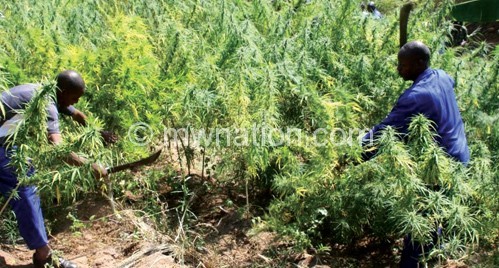‘Chamba’ can boost Malawi economy—expert
In a quest to expand its revenue base, Malawi needs to take the bold step of growing industrial hemp, with a clear conscience, as such a new venture will not only ‘fire’ the economy but is also internationally acceptable, a prominent University of Malawi professor has said.
Professor Ben Kaluwa, a Chancellor College economics lecturer, stressed this week that Malawi stands to benefit much if it starts growing industrial hemp, a plant of the same species and look-a-like with the illegal chamba (marijuana), whose growing, possession and smoking is illegal in the country.
Industrial hemp, he notes, is not used for smoking and has many by-products and uses which are quite diverse, including high-value textiles and clothing, specialised concrete applications and medicines.
Kaluwa was lending his full weight behind a proposal by Ntchisi North parliamentarian Boniface Kadzamira in the House earlier this week—that Malawi should legalise the growing and usage of marijuana, to beef up the national economy.

Stated Kadzamira: “An acre of hemp produces more paper than wood pulp or tree. Apart from paper, you can produce, from hemp, fibre, fabric, soap, lighting oil, incense, medicines, food oil and proteins for both humans and animals.
“Hemp seeds also contain all the essential amino acids necessary for health. These are some of the usages that can be derived from marijuana. And do you know that even the US Declaration of Independence was written on a hemp paper?”
Most parliamentarians laughed off Kadzamira’s apparent eccentric proposal.
But Kaluwa insists that those who are laughing off the proposal need a serious re-think.
“I do not know exactly how the issue was presented [in Parliament] and the terminology used. But I think a point is missed, and will always be missed—even by political leadership like presidents, Cabinet ministers and MPs—if the issue is intentionally misrepresented for sensationalisation,” he explains.
He said Malawi should grow the industrial hemp with a clear conscience.

Nkhotakota Police Station
He allayed fear that growing industrial hemp may seem like a government endorsement to the growing of the other illegal hemp associated with the habit-forming smoking which has proved destructive to most users.
“It does not have to be that way: the products are differentiated and not perfect substitutes in use,” Kaluwa added.
He dispelled concerns over security and the regulation of production, particularly since the two hemp products are very similar in looks.
Nation on Sunday was unable to get expert views from Bvumbwe Research Station—where police often send impounded traditional harmful chamba for certification—and Ministry of Health on Kadzamira’s proposal.






Interesting. Let us not discard the debate as nonsense. Let scientist join the debate and bring the pluses and minuses before we come to a conclusion. Funsadala